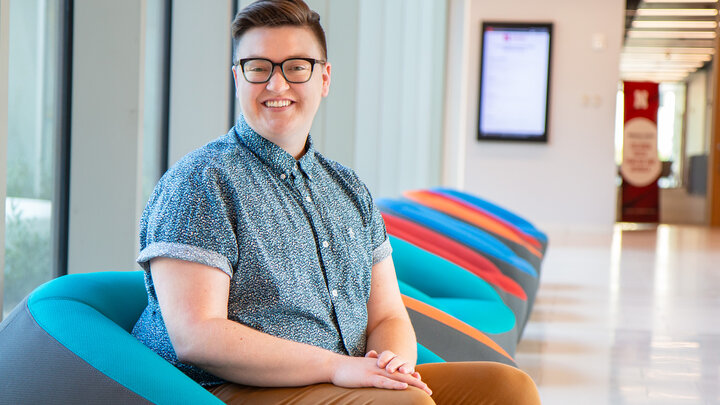Research suggests nonbinary individuals — those who do not identify exclusively as men or women — experience bias and discrimination more frequently than cisgender and binary transgender people, contributing to negative mental health outcomes.
One study revealed that 71% of transgender and nonbinary youth reported having experienced discrimination, and 46% of transgender and nonbinary adults reported being verbally harassed because of their gender identity.
Bias and discrimination toward nonbinary people are often tied to beliefs about the “normality” of cisgender identities. Research suggests that such opinions are often rooted in religious beliefs and lack of sufficient knowledge about gender fluidity.
Katelyn Coburn, assistant professor of Child, Youth and Family Studies (whose pronouns are they/them/theirs), is leading a project to help reduce health disparities that result from bias and discrimination faced by nonbinary people in all contexts, including experiences stemming from marginalizing Christian rhetoric. Because Christian religious leaders significantly influence social discourse about nonbinary people, Coburn said, research focused on increasing Christian religious leaders’ affirmation of nonbinary people is urgently needed.
With funding from an Office of Research and Innovation Layman Seed Award, Coburn will pilot the Embodied Nonbinary Affirmation (ENA) workshop, a three-hour group experience focused on understanding how the body’s nervous system — which regulates blood pressure, heart and breathing rates, body temperature and other internal body processes — contributes to bias and affirmation.
The project is designed to enhance Christian religious leaders’ affirmation of nonbinary people by giving them tools to self-regulate their nervous system, such as deep breathing and other mindfulness practices that promote inclusive attitudes, beliefs and behaviors toward nonbinary people.
“Religious leaders play such an important role in engaging with different people every day, so to get to spend a three-hour workshop with them and to offer them something different is exciting,” Coburn said. “I’ll give them some practices they can use to remain affirming of nonbinary people.”
As a graduate research assistant at North Dakota State University in Fargo, Coburn forged connections that will be used for this project. Up to 20 Christian pastors or religious leaders — most of whom have collaborated with Coburn in previous studies — will be recruited to participate. The pastors already have some understanding of nonbinary people, but want to expand their knowledge and skills.
The workshops will be in spring 2024, and each will include seven or eight participants. Coburn will share information about nonbinary gender identities and the origins of non-affirmation of gender diversity. There will also be group discussions and facilitator-led practices, such as breathing exercises pastors can use in conversations with or about nonbinary people — for example, if they speak with a congregant struggling with affirming a nonbinary child.
A pre-test just before the workshop will establish a baseline of participants’ understanding of nonbinary identities and how in touch they are with their nervous system, using a scale that assesses body awareness — for example, whether their heart rate accelerates, or if they display a closed body posture.
Pastors will also participate in a series of virtual discussions to further strengthen their nervous system regulation skills. They will share feedback on the workshop through exit interviews and a six-month follow-up survey.
“Ultimately, I want to give people tools to help change discourse to more positively impact nonbinary people,” Coburn said. “Religious authority has a lot of say about how gender diversity is talked about in society.”
For previous studies, Coburn said, recruiting pastors was surprisingly easy.
“Some of that was timing, with the increased societal discourse about the LGBTQ+ community spreading awareness of gender diversity,” Coburn said. “But much of it was the fact that in Midwest culture — and even broad Christian culture — people are willing to learn, spread information and otherwise help get people involved. Sometimes, there is a strong narrative that there are no religious people willing to affirm or learn, and that’s just not true.”
Coburn emphasizes that while people may have more to learn, there are those already celebrating nonbinary affirmation in religious communities.
“Something that can be healing for nonbinary people is knowing there are religious authorities who see them and love them for who they are,” they said. “Helping more Christian religious leaders get to that point would be very impactful.”
Data gathered from this project will be used to determine the efficacy and acceptability of the ENA workshop for larger-scale implementation. Coburn said the goal is to expand the project to Nebraska “and ideally, across the country.”
“When even one person receives an increased level of acceptance, they interact differently with people who aren’t in that marginalized group,” they said. “They have more confidence in seeing additional confirmation that they matter.”
Learn more about this project on the CYFS Research Network. This project aligns with the UNL Grand Challenge of health equity.
College of Education and Human Sciences
Child, Youth and Family Studies
Comprehensive Health & Well-Being




